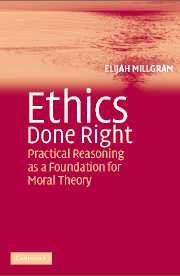Book contents
- Frontmatter
- Contents
- Acknowledgments
- Miscellaneous Frontmatter
- Introduction: The Method of Practical Reasoning
- 1 What's the Use of Utility?
- 2 Mill's Proof of the Principle of Utility
- 3 Does the Categorical Imperative Give Rise to a Contradiction in the Will?
- 4 Reasonably Virtuous
- 5 Murdoch, Practical Reasoning, and Particularism
- 6 Was Hume a Humean?
- 7 Hume on “Is” and “Ought”
- 8 Hume, Political Noncognitivism, and the History of England
- 9 Incommensurability and Practical Reasoning
- 10 Commensurability in Perspective
- 11 Varieties of Practical Reasoning and Varieties of Moral Theory
- References
- Index
2 - Mill's Proof of the Principle of Utility
Published online by Cambridge University Press: 12 November 2009
- Frontmatter
- Contents
- Acknowledgments
- Miscellaneous Frontmatter
- Introduction: The Method of Practical Reasoning
- 1 What's the Use of Utility?
- 2 Mill's Proof of the Principle of Utility
- 3 Does the Categorical Imperative Give Rise to a Contradiction in the Will?
- 4 Reasonably Virtuous
- 5 Murdoch, Practical Reasoning, and Particularism
- 6 Was Hume a Humean?
- 7 Hume on “Is” and “Ought”
- 8 Hume, Political Noncognitivism, and the History of England
- 9 Incommensurability and Practical Reasoning
- 10 Commensurability in Perspective
- 11 Varieties of Practical Reasoning and Varieties of Moral Theory
- References
- Index
Summary
In a famous, or infamous, paragraph or so early on in Chapter 4 of Utilitarianism, Mill provides his argument for the Principle of Utility. I will first quote the passage at some length, and rehearse two very familiar objections to it. Then I will go on to say what I intend to do with the material I will have introduced.
The utilitarian doctrine is, that happiness is desirable, and the only thing desirable, as an end; all other things being only desirable as means to that end. What ought to be required of this doctrine – what conditions is it requisite that the doctrine should fulfil – to make good its claim to be believed?
The only proof capable of being given that an object is visible, is that people actually see it. The only proof that a sound is audible, is that people hear it: and so of the other sources of our experience. In like manner, I apprehend, the sole evidence it is possible to produce that anything is desirable, is that people do actually desire it. If the end which the utilitarian doctrine proposes to itself were not, in theory and in practice, acknowledged to be an end, nothing could ever convince any person that it was so. No reason can be given why the general happiness is desirable except that each person, so far as he believes it to be attainable, desires his own happiness.
- Type
- Chapter
- Information
- Ethics Done RightPractical Reasoning as a Foundation for Moral Theory, pp. 56 - 88Publisher: Cambridge University PressPrint publication year: 2005
- 1
- Cited by



